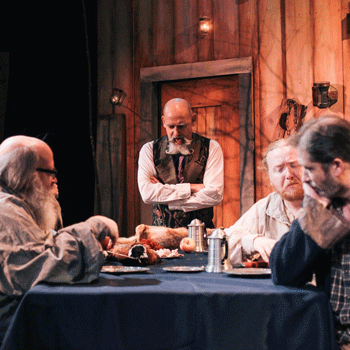 Local theaters in Fayetteville are back and ready to entertain the public with their upcoming season schedules full of new and exciting performances. With a mix of comedy, drama, mystery and musicals — there is something for everyone.
Local theaters in Fayetteville are back and ready to entertain the public with their upcoming season schedules full of new and exciting performances. With a mix of comedy, drama, mystery and musicals — there is something for everyone.
Cape Fear Regional Theatre
Cape Fear Regional Theatre will kick off their 60th season with six shows, starting with one of the world’s most successful rock ‘n’ roll musicals – “Buddy: The Buddy Holly Story” from Oct. 14 until Nov. 7.
Set in the 1950’s, the show tells the story of a young man from Texas with big glasses and big dreams catapulting to the top of the rock ‘n’ roll charts. The show will feature Holly’s popular songs like “Peggy Sue,” and “That’ll Be The Day,” along with “La Bamba,” and celebrate the man whose music and values were ahead of his time. It will be directed by Suzanne Agins, who also directed CFRT’s productions of “Dreamgirls,” “Memphis” and “Mamma Mia.”
“We’re super excited about that, it was a part of a previously planned season but we didn’t get to do it until now,” said CFRT Artistic Director Mary Kate Burke.
Next on their list is the 30th anniversary production of “The Best Christmas Pageant Ever.” BCPE follows a group struggling to put on a church Christmas pageant while faced with casting the Herdman kids who are probably the most inventively awful kids in history. For local theater-goers, this is a traditional holiday fix. CFRT’s Education Director, Marc de la Concha, will direct the show which runs Dec. 3-19.
The third show in the season will be “The Wizard of Oz,” a must-see for fans of the book, movie or original musical. Audiences will go on the journey with the classic characters of the Scarecrow, Tin Man, Lion, Dorothy, and her little dog as well.
The show will be directed by Tiffany Green, who previously directed “Shrek: The Musical.”
“Next, a smaller play that’s unfamiliar to a lot of people but is fantastic called ‘Welcome to Arroyo’s,’” said Burke. “It’s like a hip-hop coming of age story that takes place in New York.” Audiences can look forward to DJs/narrators spinning the story in a comic heartfelt piece.
“Welcome to Arroyo’s” is written by Kristoffer Diaz and runs March 10-27, 2022. The production will be performed with audience seating on stage.
The fifth show in the line-up is “Clue: On Stage” directed by Burke herself, based on the best-selling board game and movie adaption. Audiences will join Miss Scarlett, Colonel Mustard, Professor Plum, and other colorful guests for this hilarious murder mystery. This show will also be performed with audience seating on stage.
CFRT will end their season with “The Color Purple,” directed by Brian Harlan Brooks. The show is based on Alice Walker’s Pulitzer Prize-winning novel. The musical follows a woman named Celie, her heartbreak and despair, until her friend Shug helps her realize her own self-worth. Celie uses her flair for fashion to build a better future. The show features jazz, gospel, blues and African music.
The musical, like the book and the film adaptation, is a story of resilience and a testament to the healing power of love. The show is being produced with support from The Junior League of Fayetteville and the National Endowment for the Arts.
“Other than our Christmas show that happens every year, the rest of the shows depend on what’s happening in the world, what we think the community would love,” Burke said. “Sometimes we cast them based on conversations with the creative team that have done the show before.”
For more information on shows or to purchase individual or season tickets, visit https://www.cfrt.org
Gilbert Theater
The first show of Gilbert’s season will be “Dirty Rotten Scoundrels: The Musical,” which runs Oct. 1-17. The story follows two con men, a beautiful woman and the elite of the French Riviera who will collide in a sexy and irreverent farce.
“It's about con men and money and the upper crust of society and trying to swindle them out of money,” said Gilbert Theater Artistic Director Lawrence Carlisle.
Next, “The Carols,” a returning crowd favorite. The Christmas themed musical will play weekends Nov. 26 to Dec. 5 and Dec. 17-19. The show features the Carol sisters struggling to put up their annual production of “A Christmas Carol,” but there is a shortage of men due to WWII.
“We’re excited to be doing this again, it’s a really good show, it’s funny and not enough people got to see it due to COVID,” Carlisle mentioned.
The third show of the season will be “The Last Days of Judas Iscariot,” a dark comedy and thought-provoking work by Pulitzer-Prize winning playwright Stephen Adly Guirgis. The play follows Judas in purgatory where he is on trial. This show will run Jan. 28 through Feb. 13, 2022.
Carlisle said he hopes “Judas Iscariot” will be the show everyone talks about because it’s weird and reflects how the intent of theater is to entertain people.
Following that, the season will present “Othello,” adapted and directed by Montgomery Sutton. The show will run March 25 through April 10, 2022, and will tell the story of a powerful general of the Venetian army, Othello, whose life and marriage
are ruined by a conniving, deceitful and envious soldier, Iago.
Gilbert is currently the recipient of the Lilly Endowment Challenge, a grant that will match all donations up to $50,000 for the theater. Donors can contribute to the Gilbert Theater Endowment by visiting https://cumberlandcf.fcsuite.com/erp/donate/create?funit_id=1389.
For more information on season tickets and shows, visit https://www.gilberttheater.com.
Sweet Tea Shakespeare
“As of spring 2022, we will have been in Fayetteville for 10 years and so with the upcoming season we are looking forward to our 10-year anniversary,” said Jeremy Fiebig, Artistic Director for Sweet Tea Shakespeare.
Their upcoming season starts in August and the first show will be “HamLIT” directed by Traycie Kuhn-Zapata. It will showcase how the prince of Denmark goes off his rocker on the rocks in this “bLITzed” take on Shakespeare’s most famous tragedy, “Hamlet.” “HamLIT” will play Aug. 13 and 27 at Hugger Mugger in Sanford; Aug. 14 and 28 at The Church at Paddy’s in Fayetteville; and Aug. 20 and 21 at the Arts Council in Fayetteville.
Next in the season will be “Winter’s Tale by William Shakespeare,” directed by Fiebig, which will run Aug. 19 through Sept. 5. The late Shakespearean romance brings family, fairytale and forgiveness to the stage. The tale follows King Leontes as he wrongfully accuses his wife of adultery and unleashes a storm of tragedy upon the kingdom of Sicilia.
“The Winter’s Tale” will be staged and performed in Raleigh, and made available in Fayetteville via streaming later in the season.
“We do a series of Shakespeare plays... we do at bars and craft breweries called LIT,” Fiebig said. “The biggest news for us other than the anniversary is we are expanding to Raleigh as well and we’ll be streaming it so folks from Fayetteville who can’t make the drive can view it as well.”
“McLIT” will begin in October. Imagine if the writer, director and actors of “Macbeth” get lost at a frat party on their way to the show. It will be full of Shakespeare, drinking games, improv and lively music. This show is for adults only ages 18 and up. “McLit” plays Oct. 1 and 22 at Hugger Mugger in Sanford; Oct. 16 and 22 at The Church at Paddy’s in Fayetteville. Other shows will be added through April, 2022.
The classic love story “Romeo and Juliet” will be on the stage in Raleigh from Oct. 21 to Nov. 7, followed by Sweet Tea Shakespeare’s annual Christmas show, “Behold” that will play Dec. 2 through Dec. 11 that returns to Holy Trinity Episcopal Church in Fayetteville.
“Richard II” and “Henry IV, Part 1” which will be performed in rep by a single company of actors, constitutes the first half of Shakespeare’s history tetralogy — an epic tale of fathers and sons, loyalty and leadership, politics and power. It is the story of ordinary people weathering the winds of change in a fledgling nation. And it is a visceral reminder that history isn’t past; it’s not even history at all. The plays will run on alternating days in Raleigh from Jan. 13 to Jan. 30, 2022.
April brings Jane Austen’s “Emma” adapted by Assistant Artistic Director Claire F. Martin who gives Austen’s rom-com a dazzling update. The show
will run at multiple locations from April 21 to May 15, 2022.
Tickets for Sweet Tea Shakespeare performances are $20 general admission and $25 at the door, with discounts for seniors, military and students. Guests can also become a Monthly Sustainer of Sweet Tea Shakespeare for special advance ticket rates and other benefits.
For more information and show schedules, tickets and performance locations, visit https://sweetteashakespeare.com/tickets/.
Fayetteville Dinner Theatre
The Fayetteville Dinner Theatre returned to Gates Four Golf & Country Club with two successful shows this year. They opened in April with two sold-out performances of the musical comedy “A Sinister Cabaret: Love Letter/Sleight of Hand,” written and directed by Dr. Gail Morfesis and produced by Up & Coming Weekly community newspaper.
The second musical show “Beyond Broadway: Music of Our Time,” was produced and directed by Bill Bowman, the publisher of Up & Coming Weekly, and featured local performers Tim Zimmerman and Linda Flynn.
“We have an excellent feel of the type of dinner theatre entertainment the community wants,” said Bowman. “Gates Four is the perfect venue, and General Manager Kevin Lavertu has been very instrumental in assisting us in creating a theatrical venue that complements the other great live theater offerings we enjoy here in Fayetteville and Cumberland County.”
Bowman said the intent is for Gates Four to provide local patrons an entertainment experience that is different and uniquely special to Gates Four.
“It is an experience that would WOW the audiences and give the Gates Four theatre experience a unique brand,” Bowman said.
FDT accomplishes this by abandoning the traditional buffet-style dinner and show concept for a more fun, yet elegant theater experience. The evening begins with the directors welcome reception and wine tasting featuring a wide selection of local wines and trays of hors d'oeuvres. The dining room welcomes guests with draped tables, cloth napkins, candlelight, a three-course plated dinner with dual entrees, and an elegant dessert buffet at the intermission. There is pre-show entertainment during the dinner hour, and once the show is underway, there are prizes and surprises.
“The Fayetteville Dinner Theatre’s mission is to bring quality shows to local area theater-goers and provide local actors a venue to showcase their talents,” Bowman said.
Gates Four and the FDT donate the money raised from the wine tasting to local children's literacy and education organizations or other community nonprofit organizations like the Care Clinic.
While there are no shows scheduled for the rest of this calendar year, FDT does plan four shows in 2022.
In the works is “Miss Congeniality,” a musical comedy written by Bowman and being produced and directed in collaboration with Dr. Gail Morfesis.
Another planned show is “Mark Twain Himself” staring Richard Garey. This show was scheduled in May of 2020, but was canceled because of the COVID-19 pandemic. Garey is a student of history and has performed all over the world, entertaining audiences with the genuine wit and wisdom of Mark Twain.
For the latest FDT schedule, visit www.fayettevilledinnertheatre.com/.



Photos courtesy Cape Fear Regional Theatre, Gilbert Theater, Sweet Tea Shakespeare and Fayetteville Dinner Theatrewith special thanks to Jonathan Hornby Productions and Tony Wooten.